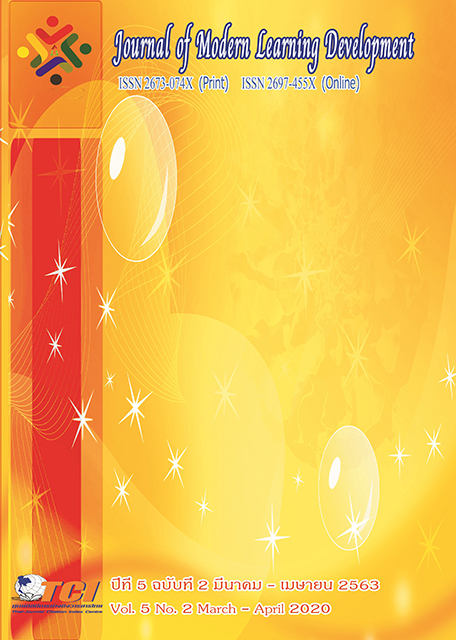Non-Traditional Threats: Elements, Indicators and its Impacts on Thai Social Security in Phetchaburi Province
Main Article Content
Abstract
This research is a qualitative and integrated research deriving from studying Tripitaka, theses, research reports, academic texts and journals as well as mass media related. Other significant data came from interviewing a group of 26 persons, a focus group of 10 persons and the questionnaire answerers of total 206 sets. The objectives of this research are 1) to study the elements of threats which indicate to be non - tradition threats 2) to study the methods and approaches the government and communities have managed with non - traditional threats and 3) to analyze the impacts of those threats on society in Phetchaburi Province and propose preventive measures to solve problems for sustainable security.
National Security Council, Thailand has categorized 9 main non – traditional threats which effect security of Thai society at national level as follows 1) dissent arising from different thinking of people in society 2) lack of confidence to regime and political institutes 3) the imbalance of natural resources and environmental management 4) disasters from natural environmental change and pandemics 5) security in 3 southern border provinces of Thailand 6) terrorism and transnational crimes 7) migrant workers and illegal immigration 8) drugs and 9) poverty. Anyway, the threats in Phetchaburi Province can be subdivided into 20 types under 4 main sectors following 1) social threats such as division derived from different thinking of people, public space invasion 2) economic threats such as poverty, flooding, city’s overflowing garbage 3) cultural and social threats such as drugs, information technology (smart phone) 4) environmental and natural resources threats such as wildfire destruction, air and water pollution. Moreover, one threat can affect many sides of security such as extreme floods have serious economic, social and environmental impacts.
As being assigned, public sectors and communities work together continually in monitoring, inspecting and tackling such threats. Anyway, there are practical difficulties that bar them from implementation. And these are problem solving guidelines for sustainable security 1) political aspect, division in political thinking of people in Phetchaburi Province at present are not serious. Conflict of interest between developers and conservatives still remain but can be tackled thru reconciling and good governance approach. 2) For economy, the authorities should seriously settle the income disparity especially investors and intermediary persons who unkindly take advantage of farmers. The government should also focus on existing projects and continue delivering tangible results such as informal debts, Thai Niyom Yangyuen including infrastructure projects concerning water management and communication thru turning policy into more efficiently practice 3) serious cultural and social threats are drugs and information technology (smart phone) which can be tackled by building strong communities especially at tambon level by integrating public sectors with houses, temples, schools, communities and private sectors. Public relations is essential to make communities understand what non – traditional threats and their impacts are. Moreover, law enforcement are needed. 4) for environment and natural resources , wildfire destruction, city’s overflowing waste and public space invasion cause pollution and destroy environment. These problems should be solved by creating strong communities, using good governance and allowing law enforcement to work effectively.
In conclusion, the essential and practical mechanism for resolving non-traditional threats sustainably are 1) strengthen the communities thru projects such as Keeping Five-Precepts in Villages 2) policy implementation which is the responsibility of the authorities 3) good governance 4) law enforcement 5) prevent corruption. Besides, many philosophy and dhamic principles could be used to support secure and sustainable society building such as economy sufficiency, 5precepts, Aparihaniyathamma 7 and Saraniyathamma 6.
Article Details
References
การป้องกันและปราบปรามการทุจริตแห่งชาติ. (2560). ยุทธศาสตร์ชาติว่าด้วยการป้องกันและปราบปรามการทุจริต ระยะที่ 3 (พ.ศ. 2560 - 2564). กรุงเทพมหานคร: การป้องกันและปราบปรามการทุจริตแห่งชาติ.
คณะรัฐมนตรี. (2560). นโยบายและแผนระดับชาติว่าด้วยความมั่นคงแห่งชาติ (พ.ศ. 2560-2564). กรุงเทพมหานคร: สำนักงานสภาความมั่นคงแห่งชาติ สำนักนายกรัฐมนตรี.
ณัฐวรรธน์ สุนทรวริทธิโชติ. (2556). การศึกษาสภาพปัญหาสิ่งแวดล้อมในเขตตำบลสามบัณฑิต: กรณีศึกษาปัจจัยที่มีผลต่อการพัฒนาทรัพยากรธรรมชาติและสิ่งแวดล้อมของประชาชน. รายงานการวิจัย. คณะมนุษยศาสตร์และสังคมศาสตร์ มหาวิทยาลัยราชภัฏพระนครศรีอยุธยา.
นิธิตา สิริพงศ์ทักษิณ. (2557). ความขัดแย้งระหว่างชุมชนท้องถิ่นกับหน่วยงานรัฐในการใช้ที่ดินสาธารณประโยชน์ทุ่งสระ จังหวัดพัทลุง. รายงานการวิจัย. กรุงเทพมหานคร: มหาวิทยาลัยรามคำแหง.
ภาราดา ชัยนิคม. (2558). ความรู้และการเตรียมความพร้อมต่อภัยคุกคามรูปแบบใหม่: กรณีศึกษา โรงเรียนมัธยมศึกษาในอำเภอเมืองจังหวัดเพชรบูรณ์. รายงานการวิจัย.คณะมนุษยศาสตร์และสังคมศาสตร์: มหาวิทยาลัยราชภัฏเพชรบูรณ์.
วุฒิชัย สายบุญจวง. (2561). ชุมชนเข้มแข็งในทัศนะของชาวชุมชน : กรณีศึกษา บ้านปลายคลองบางโพธิ์เหนือ หมู่ที่ 3 ตำบลบางโพธิ์เหนือ อำเภอสามโคก จังหวัดปทุมธานี. วารสารวไลยอลงกรณ์ปริทัศน์ (มนุษยศาสตร์และสังคมศาสตร์), 8 (1), 119-129.


